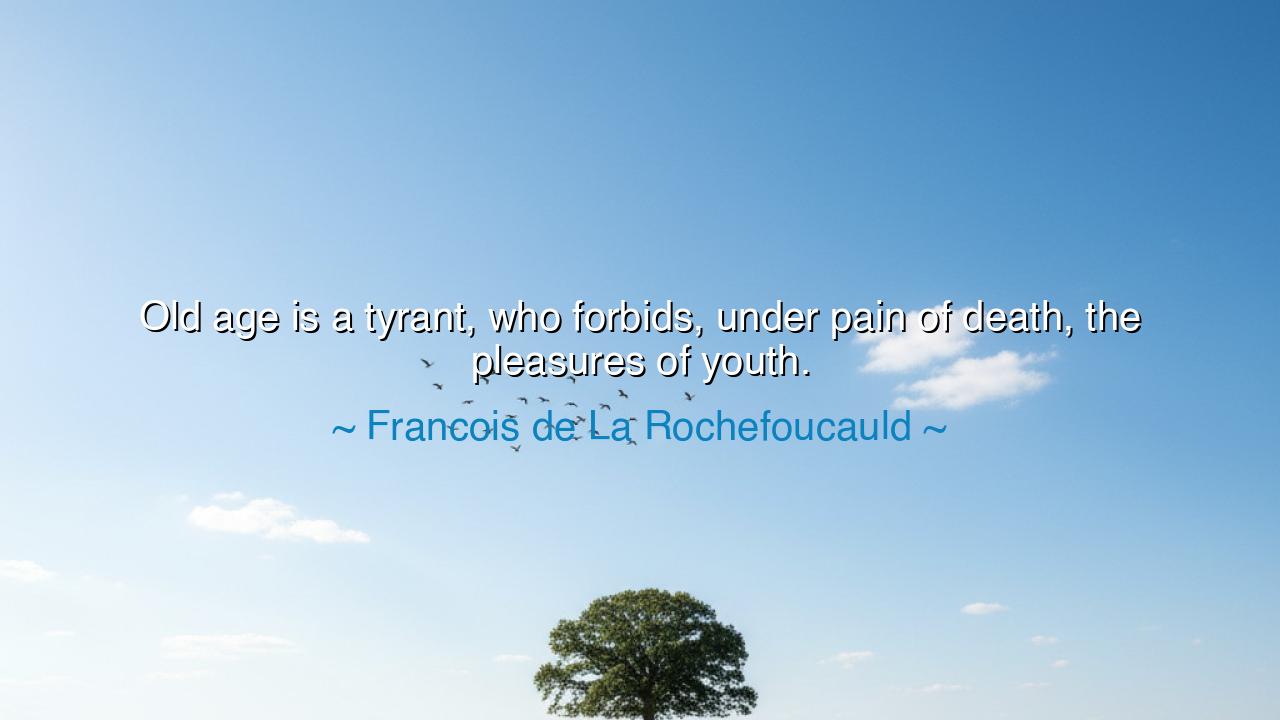
Old age is a tyrant, who forbids, under pain of death, the






"Old age is a tyrant, who forbids, under pain of death, the pleasures of youth." These words, spoken by the astute François de La Rochefoucauld, capture the cruelty of aging in its most poignant form. To see the body slow, the energy wane, and the passions of youth dim is a loss that is both deeply personal and profoundly universal. In this stark reflection, La Rochefoucauld likens old age to a tyrant, an unforgiving ruler that forces the soul to abandon the pleasures and freedoms of youth. Just as a tyrant might demand total obedience, old age compels one to surrender the vibrancy of youth, without mercy or reprieve, leaving only the memories of what once was.
In the ancient world, the passage of time was often viewed as a force to be reckoned with. The Greeks believed that the gods themselves were not free from the constraints of time. Zeus, the mightiest of the gods, was said to age and weaken, unable to escape the cycles of life and death. This idea reflects the harsh reality that even the immortal are not immune to the tyranny of time. The same held true for the heroes of ancient epics, such as Achilles, whose invincible strength was his youthful gift, only to be consumed by fate in the end. The glory of their youth, however powerful, was always overshadowed by the inevitability of old age and the limits it imposed on the body and spirit.
La Rochefoucauld’s image of a tyrant also brings to mind the stoic philosophers of ancient Rome, who, like Seneca and Epictetus, reflected deeply on the nature of aging. While they recognized that old age was a natural part of life, they also acknowledged the bitterness of watching one’s vitality diminish. The stoics, however, believed that true freedom came not from defying time, but from accepting its course with dignity and wisdom. Yet even their teachings could not escape the reality of La Rochefoucauld’s words—old age was an undeniable tyrant, one that demanded a surrender of the pleasures that youth had once freely enjoyed.
Consider the example of King Lear, a tragic figure created by the immortal William Shakespeare. In the play, Lear is not just an aging king; he is a man confronting the tyranny of old age. As his strength and wisdom begin to fade, he struggles to maintain control over his kingdom and his own life. His desire to hold onto his youthful power leads to his tragic downfall, as he is forced to come to terms with the loss of his once-commanding presence. Lear’s descent into madness mirrors the deeper human struggle with the constraints of time—a struggle that La Rochefoucauld so powerfully encapsulates. The king’s attempt to cling to the pleasures of his youth only accelerates his ruin.
The lesson within La Rochefoucauld’s words is not one of despair, but of understanding. To live is to be subject to the flow of time, and with time comes change. It is true that old age brings with it the loss of youthful vitality, but it also brings the gift of wisdom and experience. In the greatest ages, it is said that youth must be lived with abandon, but that does not mean the passing of time should be feared or rejected. Old age, though it demands the surrender of youthful pleasures, offers instead the rewards of reflection, peace, and a deeper understanding of the value of those fleeting moments.
The practical action we can take from this understanding is to cherish our youth while we have it, to experience its pleasures and passions fully, but also to prepare ourselves to embrace aging with dignity when the time comes. Like the ancients, who saw aging as part of the divine cycle of life, we must learn to see the passing of time not as a curse, but as an inevitable step in the journey. By doing so, we can live each phase of life with grace—not clinging to what is lost, but appreciating what is gained.
Therefore, let us remember that old age may be a tyrant, but it is one that teaches us valuable lessons about letting go, about finding joy not just in the pleasures of youth, but in the quiet beauty of maturity. The loss of youthful vigor is not a defeat, but a natural part of life’s ebb and flow. It is through this acceptance, through this understanding, that we can live fully, in each and every stage of life. As we walk the path from youth to old age, let us embrace each moment, knowing that both the youthful freedom and the wisdom of age are parts of the grand cycle that defines our human experience.






AAdministratorAdministrator
Welcome, honored guests. Please leave a comment, we will respond soon